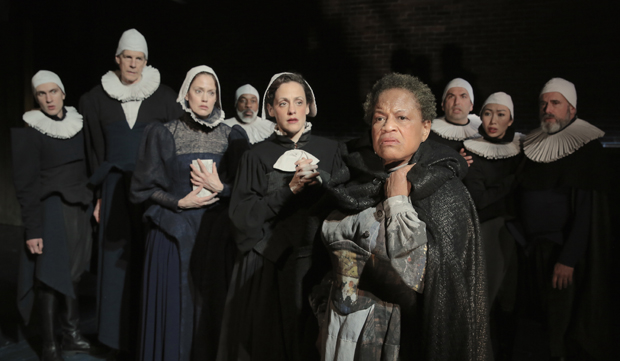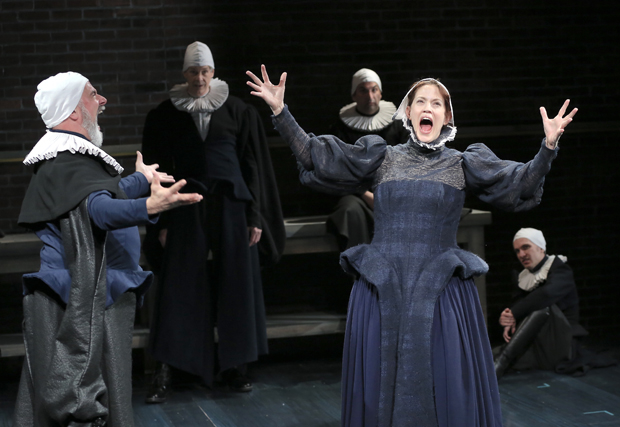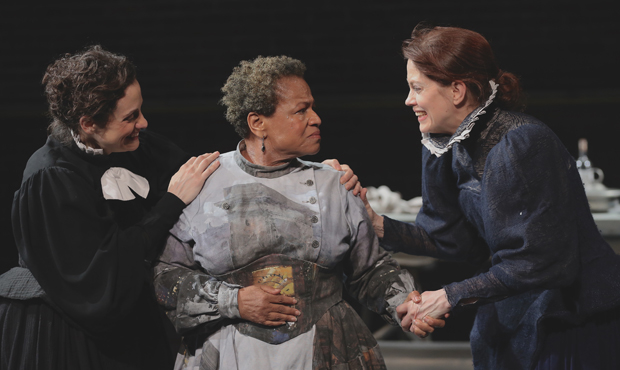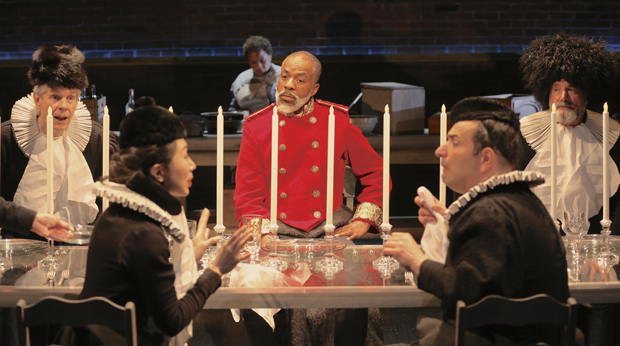A Chewy Babette's Feast off-Broadway

(© Carol Rosegg)
According to the United Nations, there are currently over 65.6 million forcibly displaced people in the world, the highest number ever recorded. That statistic alone should pique our interest in Babette's Feast. Based on the short story by Isak Dinesen, it tells the story of a refugee who flees France following the brutal suppression of the Paris Commune in 1871. Abigail Killeen conceived it for the stage (she also appears in the cast), resulting in a textually faithful script by Rose Courtney and a vigorous production by director Karin Coonrod. So why does Dinesen's story fail to move us onstage when it is so subtly bewitching on the page?
It's not that the story is unsuitable for dramatization, as anyone who has seen Gabriel Axel's 1987 Academy Award-winning film can attest. That adaptation is notable for its cinematic restraint, full of the wordless shots and pregnant pauses one expects when popping open a Blu-ray with the Criterion Collection label on it. Coonrod, however, charts a radically different course in her production, with presentational ensemble acting reminiscent of commedia dell'arte, Brecht, and (most distressingly) children's pantomime.

(© Carol Rosegg)
That tack may have seemed appropriate for a story front-loaded with exposition. The first half of the play gives us backstories on Martine (Killeen) and Philippa (Juliana Francis Kelly), two daughters of a puritan minister (Sturgis Warner) in the Norwegian outpost of Berlevåg. Martine has smitten the dashing young cavalry officer Lorenz Lowenhielm (Jeorge Bennett Watson), while Philippa enchants French opera star Achille Papin (Steven Skybell). Yet modesty and circumstance prevents either of these couples from coming together, and the two sisters slip into a life of pious spinsterhood, presiding over an ever-graying congregation.
Their lives are shaken up when Babette (Michelle Hurst) arrives at their door bearing a letter from Papin: Her family is dead and she has fled France — but she can cook. Apprehensively, they hire her as a maid, which turns out to be a great decision: She's handy in the kitchen, her haggling skills in the market are unrivaled, and she performs her work with minimal fuss. Dinesen (who was something of an extraordinary character herself) writes that the congregation came to see Babette as, "the dark Martha in the house of their two fair Marys," a line Courtney smartly retains. They pray for her wellbeing, and dread the day she may one day return to France.

(© Carol Rosegg)
Hurst plays Babette with the right amount of furtive emotion and unflappable dignity. We can only guess at where she's been or what she's seen, but we know that she's going to do her utmost to succeed in her new surroundings, just like the vast majority of refugees who resettle in new lands. Hurst tells this story with quiet humanity.
Perhaps as a way to accentuate Babette's foreignness, Coonrod directs the rest of the cast to appear as unnatural and stagy as possible. Everyone shares narration duty while the actors of the six-person ensemble mug their way through multiple roles. Killeen and Kelly portray the sisters in a more sober fashion, so much so that these two different characters become indistinguishable puritan cutouts. None of the comedy lands: This is exemplified in a scene depicting Babette preparing a banquet of imaginary food, with the ensemble flitting around her like mimes that have been given permission to vocalize. We are unsurprised when they use the opportunity to do a knockoff Michael Winslow routine.
Despite the general misdirection, the designers achieve the aesthetic that Coonrad demands. Oana Botez's costumes simultaneously suggest puritans and commedia clowns. The heavy wooden beams hanging over Christopher Akerlind's uncluttered set evoke Scandinavia. One long preparation table, seemingly lifted from a Le Pain Quotidien, serves as the central set piece, and is used in a variety of inventive ways. Akerlind's simple and efficient lighting tells our eyes where to focus. Kate Marvin's sound design announces itself at key moments, like when the jingle of sleigh bells heralds the approach of now-General Lowenhielm for a climactic final dinner.

(© Carol Rosegg)
Unfortunately, this story about the bonds that can be forged (or rekindled) over a great meal is hard to grasp when everyone is holding their characters at arm's length. The form just doesn't fit the content. It's like ordering a delicate soufflé and receiving a plate of fried Oreos garnished with Pixy Stix. If the creative team behind Babette's Feast is really dead-set on using this pseudo-Brechtian approach (as the projected scene titles suggest), they should have used this platform to more explicitly inform us why the refugee story matters now more than ever. As it is, we walk away from this alleged feast with our stomachs rumbling.










